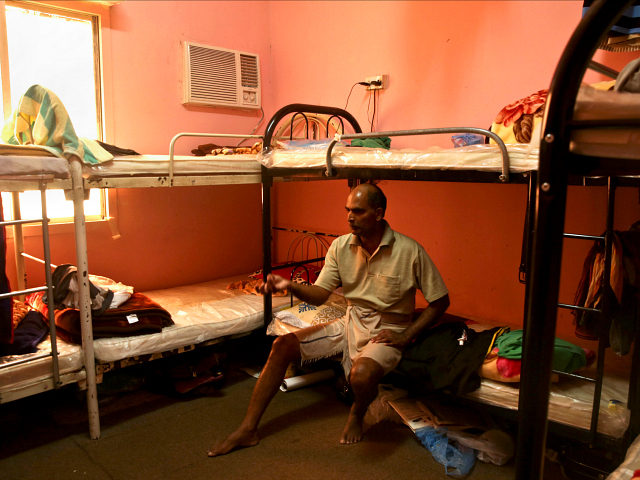Statistics recently released by the government of Qatar indicate 58 percent of people in the country live in government-designated “labor camps,” highly-monitored neighborhoods designed to control the movement of migrant workers.
The Agence-France Presse (AFP) cites Qatar’s Ministry of Development Planning and Statistics, which recently released numerous infographics and a longer report on the nation’s population. The report notes that 1.4 million people, most male, in Qatar live in labor camps — or government-designated worker housing complexes — as of April 2015. The population of Qatar has since increased by about 100,000 largely due to its recruitment of foreign workers.
Qatar boasts one of the largest per capita foreign laborer populations in the world and was recently ranked fifth by the Global Slavery Index due to the harrowing conditions many of the nation’s laborers must face upon arriving in the country. According to Qatar’s profile in the index, a population of 30,300 people can be confirmed to be living in slavery in Qatar, most foreign workers from southeast Asia, particularly India.
Foreign workers looking to get jobs in Qatar often must pay “recruiters” to help them find a job to begin with, typically needing to borrow money to pay off the recruiter. Once they are hired, they spend most, if not all, of their salaries trying to repay this debt at high interest rates. “Between the recruitment fees, the interest rates and the fact that their wages, even when paid in full, are often substantially lower than the level misrepresented to them when accepting the job, many workers are completely unable to escape the cycle of debt,” the Global Slavery Index notes.
The result is a situation in which many workers do not have enough money to pay for housing or even food. Many starve to death; many are forced into government-built labor camps. They are unable to seek a new employer, as their current employer may confiscate the foreign documents required for them to apply for a new job or go back to their home countries if they so choose.
Among the challenges Qatari workers face, the Index notes, are:
…work performed under the threat of penalty or deportation, deprivation of food, inadequate accommodation with limited or no privacy, physical confinement in the work location/labour camp severely restricting freedom of movement, misrepresentation and substitution of types and terms of work, confiscation of identity documents, non-payment, withholding and/or deductions from pay, and unsafe working conditions in extremely high temperatures.
Reports of major human rights violations and slavery have increased significantly since Qatar won its bid to host the 2022 FIFA World Cup, as the nation pledged to build a variety of facilities to host both soccer matches and the wave of tourists expected for the event. In 2014, the New York Times wrote that the increase in importing foreign workers created a population that was 90 percent migrant workers. It cited human rights NGO statistics to conclude that up to 4,000 migrant workers could be dead by the time the work is completed in 2022.
The AFP report notes that one way Qatar has responded to the international criticism is to build larger and allegedly more comfortable labor camps. The newest, nicknamed “Labour City” and costing $825 million, is built to house up to 70,000 people.
Indian President Narendra Modi visited Qatar this weekend to meet with migrant laborers and reportedly address their plight with the Qatari government. Speaking to a group of Indian workers in Doha, the capital, Modi promised that he would talk to Qatari officials about their working conditions. “I am aware of the issues you are facing. I will talk about it when I meet the authorities,” he said, adding, “If you have some issues on changing some laws and regulations, I can assure you that I will work with you all to bring about these changes.”
According to a statement released by Qatar’s Prime Minister’s Office, “The Qatari side briefed the Indian side on the reform in labour laws which would protect the interest of skilled and unskilled labour in Qatar.”

COMMENTS
Please let us know if you're having issues with commenting.